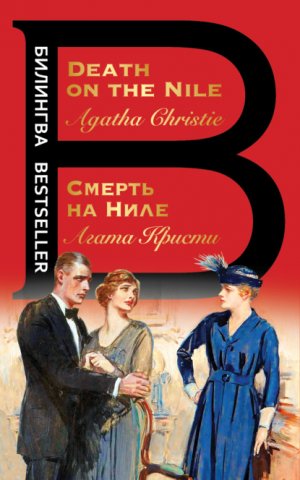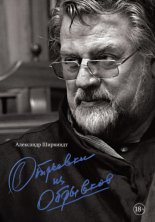Ñìåðòü íà Íèëå / Death on the Nile Êðèñòè Àãàòà

The compartment in which Poirot found himself was occupied by an elderly lady with a very wrinkled face, a stiff white stock, a good many diamonds and an expression of reptilian contempt for the majority of mankind.
She treated Poirot to an aristocratic glare and retired behind the pages of an American magazine. A big, rather clumsy young woman of under thirty was sitting opposite her. She had eager brown eyes rather like a dog’s, untidy hair, and a terrific air of willingness to please. At intervals the old lady looked over the top of her magazine and snapped an order at her.
‘Cornelia, collect the rugs. When we arrive look after my dressing-case. On no account let anyone else handle it. Don’t forget my paper-cutter.’
The train run was brief. In ten minutes’ time they came to rest on the jetty where the S. S. Karnak was awaiting them. The Otterbournes were already on board.
The Karnak was a smaller steamer than the Papyrus and the Lotus, the First Cataract steamers, which are too large to pass through the locks of the Aswan dam. The passengers went on board and were shown their accommodation. Since the boat was not full, most of the passengers had accommodation on the promenade deck. The entire forward part of this deck was occupied by an observation saloon, all glass-enclosed, where the passengers could sit and watch the river unfold before them. On the deck below were a smoking room and a small drawing room and on the deck below that, the dining saloon.
Having seen his possessions disposed in his cabin, Poirot came out on the deck again to watch the process of departure. He joined Rosalie Otterbourne, who was leaning over the side.
‘So now we journey into Nubia. You are pleased, Mademoiselle?’
The girl drew a deep breath.
‘Yes. I feel that one’s really getting away from things at last.’ She made a gesture with her hand. There was a savage aspect about the sheet of water in front of them, the masses of rock without vegetation that came down to the water’s edge – here and there a trace of houses abandoned and ruined as a result of the damming up of the waters. The whole scene had a melancholy, almost sinister charm. ‘Away from people,’ said Rosalie Otterbourne.
‘Except those of our own number, Mademoiselle?’
She shrugged her shoulders. Then she said:
‘There’s something about this country that makes me feel – wicked. It brings to the surface all the things that are boiling inside one. Everything’s so unfair – so unjust.’
‘I wonder. You cannot judge by material evidence.’
Rosalie muttered:
‘Look at – at some people’s mothers – and look at mine. There is no God but Sex, and Salome Otterbourne is its Prophet.’ She stopped. ‘I shouldn’t have said that, I suppose.’
Poirot made a gesture with his hands.
‘Why not say it – to me? I am one of those who hear many things. If, as you say, you boil inside – like the jam – Eh bien, let the scum come to the surface, and then one can take it off with a spoon, so.’ He made a gesture of dropping something into the Nile. ‘Then, it has gone.’
Rosalie said:
‘What an extraordinary man you are!’ Her sulky mouth twisted into a smile. Then she suddenly stiffened as she exclaimed: ‘Well, here are Mrs Doyle and her husband! I’d no idea they were coming on this trip!’
Linnet had just emerged from a cabin halfway down the deck. Simon was behind her. Poirot was almost startled by the look of her – so radiant, so assured. She looked positively arrogant with happiness. Simon Doyle, too, was a transformed being. He was grinning from ear to ear and looking like a happy schoolboy.
‘This is grand,’ he said as he too leaned on the rail. ‘I’m really looking forward to this trip, aren’t you, Linnet? It feels somehow so much less touristy – as though we were really going into the heart of Egypt.’
His wife responded quickly:
‘I know. It’s so much – wilder, somehow.’
Her hand slipped through his arm. He pressed it close to his side.
‘We’re off, Lin,’ he murmured.
The steamer was drawing away from the jetty. They had started on their seven-day journey to the Second Cataract and back.
Behind them a light silvery laugh rang out. Linnet whipped round.
Jacqueline de Bellefort was standing there. She seemed amused.
‘Hullo, Linnet! I didn’t expect to find you here. I thought you said you were staying in Aswan another ten days. This is a surprise!’
‘You – you didn’t-’Linnet’s tongue stammered. She forced a ghastly conventional smile. ‘I didn’t expect to see you either.’
‘No?’
Jacqueline moved away to the other side of the boat. Linnet’s grasp on her husband’s arm tightened.
‘Simon – Simon-’
All Doyle’s good-natured pleasure had gone. He looked furious. His hands clenched themselves in spite of his effort at self-control.
The two of them moved a little away. Without turning his head Poirot caught scraps of disjointed words.
‘… turn back… impossible… we could…’ and then, slightly louder, Doyle’s voice, despairing but grim. ‘We can’t run away for ever, Lin. We’ve got to go through with it now …’
It was some hours later. Daylight was just fading. Poirot stood in the glass-enclosed saloon looking straight ahead. The Karnak was going through a narrow gorge. The rocks came down with a kind of sheer ferocity to the river flowing deep and swift between them. They were in Nubia now.
He heard a movement and Linnet Doyle stood by his side. Her fingers twisted and untwisted themselves; she looked as he had never yet seen her look. There was about her the air of a bewildered child. She said:
‘Monsieur Poirot, I’m afraid – I’m afraid of everything. I’ve never felt like this before. All these wild rocks and the awful grimness and starkness. Where are we going? What’s going to happen? I’m afraid, I tell you. Everyone hates me. I’ve never felt like that before. I’ve always been nice to people – I’ve done things for them – and they hate me – lots of people hate me. Except for Simon, I’m surrounded by enemies… It’s terrible to feel – that there are people who hate you…’
‘But what is all this, Madame?’
She shook her head.
‘I suppose – it’s nerves… I just feel that – everything’s unsafe all round me.’
She cast a quick nervous glance over his shoulder. Then she said abruptly: ‘How will all this end? We’re caught here. Trapped. There’s no way out. We’ve got to go on. I–I don’t know where I am.’
She slipped down on to a seat. Poirot looked down on her gravely; his glance was not untinged with compassion.
She said:
‘How did she know we were coming on this boat? How could she have known?’
Poirot shook his head as he answered:
‘She has brains, you know.’
‘I feel as though I shall never escape from her.’
Poirot said: ‘There is one plan you might have adopted. In fact I am surprised that it did not occur to you. After all, with you, Madame, money is no object. Why did you not engage in your own private dahabeeyah?’
Linnet shook her head rather helplessly.
‘If we’d known about all this – but you see we didn’t – then. And it was difficult…’ She flashed out with sudden impatience: ‘Oh! you don’t understand half my difficulties. I’ve got to be careful with Simon… He’s – he’s absurdly sensitive – about money. About my having so much! He wanted me to go to some little place in Spain with him – he – he wanted to pay all our honeymoon expenses himself. As if it mattered! Men are stupid! He’s got to get used to – to – living comfortably. The mere idea of a dahabeeyah upset him – the – the needless expense. I’ve got to educate him – gradually.’
She looked up, bit her lip vexedly, as though feeling that she had been led into discussing her difficulties rather too unguardedly.
She got up.
‘I must change. I’m sorry, Monsieur Poirot. I’m afraid I’ve been talking a lot of foolish nonsense.’
Chapter 7
Mrs Allerton, looking quiet and distinguished in her simple black lace evening gown, descended two decks to the dining room. At the door of it her son caught her up.
‘Sorry, darling. I thought I was going to be late.’
‘I wonder where we sit.’
The saloon was dotted with little tables. Mrs Allerton paused till the steward, who was busy seating a party of people, could attend to them.
‘By the way,’ she added, ‘I asked little Hercule Poirot to sit at our table.’
‘Mother, you didn’t!’ Tim sounded really taken aback and annoyed.
His mother stared at him in surprise. Tim was usually so easy going.
‘My dear, do you mind?’
‘Yes, I do. He’s an unmitigated little bounder!’
‘Oh, no, Tim! I don’t agree with you.’
‘Anyway, what do we want to get mixed up with an outsider for? Cooped up like this on a small boat, that sort of thing is always a bore. He’ll be with us morning, noon and night.’
‘I’m sorry, dear.’ Mrs Allerton looked distressed. ‘I thought really it would amuse you. After all, he must have had a varied experience. And you love detective stories.’
Tim grunted:
‘I wish you wouldn’t have these bright ideas, Mother. We can’t get out of it now, I suppose?’
‘Really, Tim, I don’t see how we can.’
‘Oh, well, we shall have to put up with it, I suppose.’
The steward came to them at this minute and led them to a table. Mrs Allerton’s face wore rather a puzzled expression as she followed him. Tim was usually so easy-going and good-tempered. This outburst was quite unlike him. It wasn’t as though he had the ordinary Britisher’s dislike – and mistrust – of foreigners. Tim was very cosmopolitan. Oh, well – she sighed. Men were incomprehensible! Even one’s nearest and dearest had unsuspected reactions and feelings.
As they took their places, Hercule Poirot came quickly and silently into the dining-saloon. He paused with his hand on the back of the third chair.
‘You really permit, Madame, that I avail myself of your kind suggestion?’
‘Of course. Sit down, Monsieur Poirot.’
‘You are most amiable.’
She was uneasily conscious that as he seated himself he shot a swift glance at Tim, and that Tim had not quite succeeded in masking a somewhat sullen expression.
Mrs Allerton set herself to produce a pleasant atmosphere. As they drank their soup, she picked up the passenger list which had been placed beside her plate.
‘Let’s try and identify everybody,’ she suggested cheerfully. ‘I always think that’s rather fun.’ She began reading. ‘Mrs Allerton, Mr T. Allerton. That’s easy enough! Miss de Bellefort. They’ve put her at the same table as the Otterbournes, I see. I wonder what she and Rosalie will make of each other. Who comes next? Dr Bessner. Dr Bessner? Who can identify Dr Bessner?’ She bent her glance on a table at which four men sat together. ‘I think he must be the fat one with the closely shaved head and the moustache. A German, I should imagine. He seems to be enjoying his soup very much.’ Certain succulent noises floated across to them.
Mrs Allerton continued:
‘Miss Bowers? Can we make a guess at Miss Bowers? There are three or four women – no, we’ll leave her for the present. Mr and Mrs Doyle. Yes, indeed, the lions of this trip. She really is very beautiful, and what a perfectly lovely frock she is wearing.’
Tim turned round in his chair. Linnet and her husband and Andrew Pennington had been given a table in the corner. Linnet was wearing a white dress and pearls.
‘It looks frightfully simple to me,’ said Tim. ‘Just a length of stuff with a kind of cord round the middle.’
‘Yes, darling,’ said his mother. ‘A very nice manly description of an eighty-guinea model.’
‘I can’t think why women pay so much for their clothes,’ Tim said. ‘It seems absurd to me.’
Mrs Allerton proceeded with her study of her fellow passengers.
‘Mr Fanthorp must be the intensely quiet young man who never speaks, at the same table as the German. Rather a nice face, cautious but intelligent.’
Poirot agreed.
‘He is intelligent – yes. He does not talk, but he listens very attentively and he also watches. Yes, he makes good use of his eyes Not quite the type you would expect to find travelling for pleasure in this part of the world. I wonder what he is doing here.’
‘Mr Ferguson,’ read Mrs Allerton. ‘I feel that Ferguson must be our anti-capitalist friend. Mrs Otterbourne, Miss Otterbourne. We know all about them. Mr Pennington? Alias Uncle Andrew. He’s a good-looking man, I think-’
‘Now, Mother,’ said Tim.
‘I think he’s very good-looking in a dry sort of way,’ said Mrs Allerton. ‘Rather a ruthless jaw. Probably the kind of man one reads about in the paper, who operates on Wall Street – or is it in Wall Street? I’m sure he must be extremely rich. Next – Monsieur Hercule Poirot – whose talents are really being wasted. Can’t you get up a crime for Monsieur Poirot, Tim?’
But her well-meant banter only seemed to annoy her son anew. He scowled and Mrs Allerton hurried on.
‘Mr Richetti. Our Italian archaeological friend. Then Miss Robson and last of all Miss Van Schuyler. The last’s easy. The very ugly old American lady who obviously feels herself the queen of the boat and who is clearly going to be very exclusive and speak to nobody who doesn’t come up to the most exacting standards! She’s rather marvellous, isn’t she, really? A kind of period piece. The two women with her must be Miss Bowers and Miss Robson – perhaps a secretary, the thin one with pince-nez, and a poor relation, the rather pathetic young woman who is obviously enjoying herself in spite of being treated like a slave. I think Robson’s the secretary woman and Bowers is the poor relation.’
‘Wrong, Mother,’ said Tim, grinning. He had suddenly recovered his good humour.
‘How do you know?’
‘Because I was in the lounge before dinner and the old bean said to the companion woman: “Where’s Miss Bowers? Fetch her at once, Cornelia.” And away trotted Cornelia like an obedient dog.’
‘I shall have to talk to Miss Van Schuyler,’ mused Mrs Allerton.
Tim grinned again.
‘She’ll snub you, Mother.’
‘Not at all. I shall pave the way by sitting near her and conversing in low (but penetrating) well-bred tones about any h2d relations and friends I can remember. I think a casual mention of your second cousin once removed, the Duke of Glasgow, would probably do the trick.’
‘How unscrupulous you are, Mother!’
Events after dinner were not without their amusing side to a student of human nature.
The socialistic young man (who turned out to be Mr Ferguson as deduced) retired to the smoking room, scorning the assemblage of passengers in the observation saloon on the top deck.
Miss Van Schuyler duly secured the best and most undraughty position there by advancing firmly on a table at which Mrs Otterbourne was sitting and saying:
‘You’ll excuse me, I am sure, but I think my knitting was left here!’
Fixed by a hypnotic eye, the turban rose and gave ground. Miss Van Schuyler established herself and her suite. Mrs Otterbourne sat down nearby and hazarded various remarks, which were met with such chilling politeness that she soon gave up. Miss Van Schuyler then sat in glorious isolation. The Doyles sat with the Allertons. Dr Bessner retained the quiet Mr Fanthorp as a companion. Jacqueline de Bellefort sat by herself with a book. Rosalie Otterbourne was restless. Mrs Allerton spoke to her once or twice and tried to draw her into their group, but the girl responded ungraciously.
M. Hercule Poirot spent his evening listening to an account of Mrs Otterbourne’s mission as a writer.
On his way to his cabin that night he encountered Jacqueline de Bellefort. She was leaning over the rail and as she turned her head he was struck by the look of acute misery on her face. There was now no insouciance, no malicious defiance, no dark flaming triumph.
‘Good night, Mademoiselle.’
‘Good night, Monsieur Poirot.’ She hesitated, then said: ‘You were surprised to find me here?’
‘I was not so much surprised as sorry – very sorry…’ He spoke gravely.
‘You mean sorry – for me?’
‘That is what I meant. You have chosen, Mademoiselle, the dangerous course… As we here in this boat have embarked on a journey, so you too have embarked on your own private journey – a journey on a swiftmoving river, between dangerous rocks, and heading for who knows what currents of disaster…’
‘Why do you say this?’
‘Because it is true… You have cut the bonds that moored you to safety. I doubt now if you could turn back if you would.’
She said very slowly: ‘That is true…’ Then she flung her head back. ‘Ah, well – one must follow one’s star – wherever it leads.’
‘Beware, Mademoiselle, that it is not a false star…’
She laughed and mimicked the parrot cry of the donkey boys:
‘That very bad star, sir! That star fall down…’
He was just dropping off to sleep when the murmur of voices awoke him. It was Simon Doyle’s voice he heard, repeating the same words he had used when the steamer left Shellal.
‘We’ve got to go through with it now…’
‘Yes,’ thought Hercule Poirot to himself, ‘we have got to go through with it now…’
He was not happy.
Chapter 8
The steamer arrived early next morning at Ez-Zebua. Cornelia Robson, her face beaming, a large flapping hat on her head, was one of the first to hurry on shore. Cornelia was not good at snubbing people. She was of an amiable disposition and disposed to like all her fellow creatures. The sight of Hercule Poirot, in a white suit, pink shirt, large black bow tie and a white topee, did not make her wince as the aristocratic Miss Van Schuyler would assuredly have winced. As they walked together up an avenue of sphinxes, she responded readily to his conventional opening,
‘Your companions are not coming ashore to view the temple?’
‘Well, you see, Cousin Marie – that’s Miss Van Schuyler – never gets up very early. She has to be very, very careful of her health. And of course she wanted Miss Bowers, that’s her hospital nurse, to do things for her. And she said, too, that this isn’t one of the best temples – but she was frightfully kind and said it would be quite all right for me to come.’
‘That was very gracious of her,’ said Poirot dryly.
The ingenuous Cornelia agreed unsuspectingly.
‘Oh, she’s very kind. It’s simply wonderful of her to bring me on this trip. I do feel I’m a lucky girl. I just could hardly believe it when she suggested to Mother that I should come too.’
‘And you have enjoyed it – yes?’
‘Oh, it’s been wonderful. I’ve seen Italy – Venice and Padua and Pisa – and then Cairo – only Cousin Marie wasn’t very well in Cairo, so I couldn’t get around much, and now this wonderful trip up to Wadi Halfa and back.’
Poirot said, smiling:
‘You have the happy nature, Mademoiselle.’
He looked thoughtfully from her to the silent, frowning Rosalie, who was walking ahead by herself.
‘She’s very nice looking, isn’t she?’ said Cornelia, following his glance. ‘Only kind of scornful looking. She’s very English, of course. She’s not as lovely as Mrs Doyle. I think Mrs Doyle’s the loveliest, the most elegant woman I’ve ever seen! And her husband just worships the ground she walks on, doesn’t he? I think that greyhaired lady is kind of distinguished looking, don’t you? She’s a cousin of a duke, I believe. She was talking about him right near us last night. But she isn’t actually h2d herself, is she?’
She prattled on until the dragoman in charge called a halt and began to intone:
‘This temple was dedicated to Egyptian God Amon and the Sun God Re-Harakhte – whose symbol was hawk’s head…’
It droned on. Dr Bessner, Baedeker in hand, mumbled to himself in German. He preferred the written word.
Tim Allerton had not joined the party. His mother was breaking the ice with the reserved Mr Fanthorp. Andrew Pennington, his arm through Linnet Doyle’s, was listening attentively, seemingly most interested in the measurements as recited by the guide.
‘Sixty-five feet high, is that so? Looks a little less to me. Great fellow, this Rameses. An Egyptian live wire.’
‘A big business man, Uncle Andrew.’
Andrew Pennington looked at her appreciatively.
‘You look fine this morning, Linnet. I’ve been a mite worried about you lately. You’ve looked kind of peaky.’
Chatting together, the party returned to the boat. Once more the Karnak glided up the river. The scenery was less stern now. There were palms, cultivation.
It was as though the change in the scenery had relieved some secret oppression that had brooded over the passengers. Tim Allerton had got over his fit of moodiness. Rosalie looked less sulky. Linnet seemed almost light hearted.
Pennington said to her: ‘It’s tactless to talk business to a bride on her honeymoon, but there are just one or two things-’
‘Why, of course, Uncle Andrew.’ Linnet at once became businesslike. ‘My marriage has made a difference, of course.’
‘That’s just it. Some time or other I want your signature to several documents.’
‘Why not now?’
Andrew Pennington glanced round. Their corner of the observation saloon was quite untenanted. Most of the people were outside on the deck space between the observation saloon and the cabin. The only occupants of the saloon were Mr Ferguson – who was drinking beer at a small table in the middle, his legs encased in their dirty flannel trousers stuck out in front of him, whilst he whistled to himself in the intervals of drinking – M. Hercule Poirot, who was sitting before him, and Miss Van Schuyler, who was sitting in a corner reading a book on Egypt.
‘That’s fine,’ said Andrew Pennington. He left the saloon.
Linnet and Simon smiled at each other – a slow smile that took a few minutes to come to full fruition.
He said: ‘All right, sweet?’
‘Yes, still all right… Funny how I’m not rattled any more.’
Simon said with deep conviction in his tone: ‘You’re marvellous.’
Pennington came back. He brought with him a sheaf of closely written documents.
‘Mercy!’ cried Linnet. ‘Have I got to sign all these?’
Andrew Pennington was apologetic.
‘It’s tough on you, I know. But I’d just like to get your affairs put in proper shape. First of all there’s the lease of the Fifth Avenue property… then there are the Western Land Concessions…’
He talked on, rustling and sorting the papers. Simon yawned.
The door to the deck swung open and Mr Fanthorp came in. He gazed aimlessly round, then strolled forward and stood by Poirot looking out at the pale blue water and the yellow enveloping sands…
‘-you sign just there,’ concluded Pennington, spreading a paper before Linnet and indicating a space.
Linnet picked up the document and glanced through it. She turned back once to the first page, then, taking up the fountain pen Pennington had laid beside her, she signed her name Linnet Doyle…
Pennington took away the paper and spread out another. Fanthorp wandered over in their direction. He peered out through the side window at something that seemed to interest him on the bank they were passing.
‘That’s just the transfer,’ said Pennington. ‘You needn’t read it.’
But Linnet took a brief glance through it. Pennington laid down a third paper. Again Linnet perused it carefully.
‘They’re all quite straightforward,’ said Andrew. ‘Nothing of interest. Only legal phraseology.’
Simon yawned again.
‘My dear girl, you’re not going to read the whole lot through, are you? You’ll be at it till lunch time and longer.’
‘I always read everything through,’ said Linnet. ‘Father taught me to do that. He said there might be some clerical error.’
Pennington laughed rather harshly.
‘You’re a grand woman of business, Linnet.’
‘She’s much more conscientious than I’d be,’ said Simon, laughing. ‘I’ve never read a legal document in my life. I sign where they tell me to sign on the dotted line – and that’s that.’
‘That’s frightfully slipshod,’ said Linnet disapprovingly.
‘I’ve no business head,’ said Simon cheerfully. ‘Never had. A fellow tells me to sign – I sign. It’s much the simplest way.’
Andrew Pennington was looking at him thoughtfully. He said dryly, stroking his upper lip,
‘A little risky sometimes, Doyle?’
‘Nonsense,’ replied Simon. ‘I’m not one of those people who believe the whole world is out to do one down. I’m a trusting kind of fellow – and it pays, you know. I’ve hardly ever been let down.’
Suddenly, to everyone’s surprise, the silent Mr Fanthorp swung around and addressed Linnet.
‘I hope I’m not butting in, but you must let me say how much I admire your businesslike capacity. In my profession – er – I am a lawyer – I find ladies sadly unbusinesslike. Never to sign a document unless you read it through is admirable – altogether admirable.’
He gave a little bow. Then, rather red in the face, he turned once more to contemplate the banks of the Nile.
Linnet said rather uncertainly, ‘Er – thank you…’ She bit her lip to repress a giggle. The young man had looked so preternaturally solemn. Andrew Pennington looked seriously annoyed. Simon Doyle looked uncertain whether to be annoyed or amused.
The backs of Mr Fanthorp’s ears were bright crimson.
‘Next, please,’ said Linnet, smiling up at Pennington.
But Pennington looked decidedly ruffled.
‘I think perhaps some other time would be better,’ he said stiffly. ‘As – er – Doyle says, if you have to read through all these we shall be here till lunch time. We mustn’t miss enjoying the scenery. Anyway those first two papers were the only urgent ones. We’ll settle down to business later.’
Linnet said: ‘It’s frightfully hot in here. Let’s go outside.’
The three of them passed through the swing door. Hercule Poirot turned his head. His gaze rested thoughtfully on Mr Fanthorp’s back; then it shifted to the lounging figure of Mr Ferguson, who had his head thrown back and was still whistling softly to himself.
Finally Poirot looked over at the upright figure of Miss Van Schuyler in her corner. Miss Van Schuyler was glaring at Mr Ferguson.
The swing door on the port side opened and Cornelia Robson hurried in.
‘You’ve been a long time,’ snapped the old lady. ‘Where’ve you been?’
‘I’m so sorry, Cousin Marie. The wool wasn’t where you said it was. It was in another case altogther-’
‘My dear child, you are perfectly hopeless at finding anything! You are willing, I know, my dear, but you must try to be a little cleverer and quicker. It only needs concentration.’
‘I’m so sorry, Cousin Marie. I’m afraid I am very stupid.’
‘Nobody need be stupid if they try, my dear. I have brought you on this trip, and I expect a little attention in return.’
Cornelia flushed.
‘I’m very sorry, Cousin Marie.’






